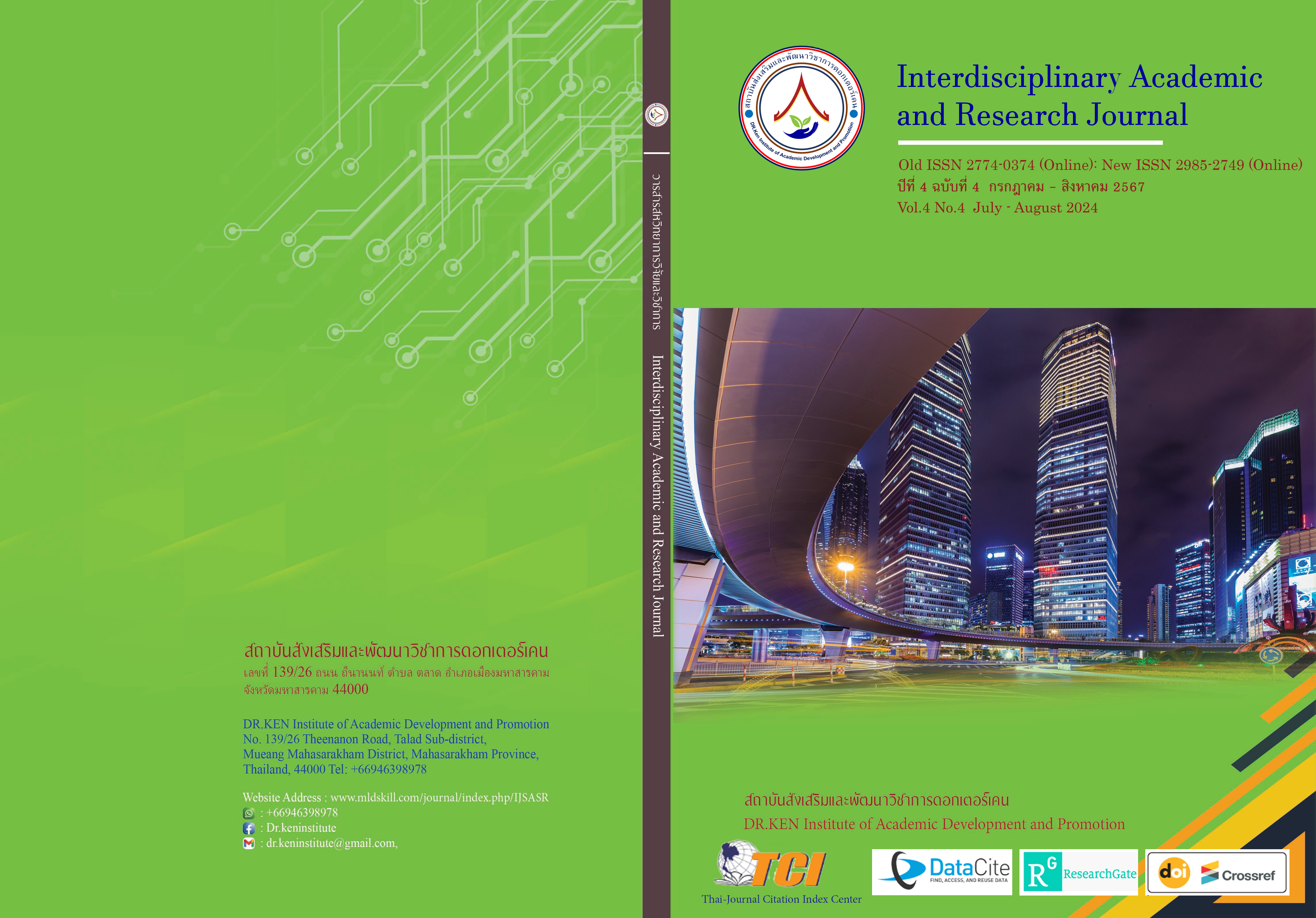Academic Leadership in the 21st Century Affecting the Inclusive Education Management in Schools Under the Authority of the Bangkok Metropolitan Administration
DOI:
https://doi.org/10.60027/iarj.2024.276825Keywords:
Academic Leadership in the 21st Century;, Inclusive Education Management; , TeacherAbstract
Background and Aims: Academic leadership in the 21st century is a set of skills, behaviors, and practices that are important for the development of learning management in educational institutions especially the management of co-educational education for children with special needs. When administrators have academic leadership in the 21st century, it will result in being able to manage co-learning well. To either achieve the aims or objectives of the organization
The purposes of this research are as follows : (1) to study the level of academic leadership in the 21st century in schools under the Bangkok Metropolitan (2) to study the level of inclusive education management in schools under the Bangkok Metropolitan (3) to study the relationship between academic leadership in the 21st century and the level of inclusive education management in schools under the Bangkok metropolitan, and (4) to study the level of academic leadership in the 21st century affect the level of inclusive education management in schools under the Bangkok metropolitan.
Methodology: The samples in this research were 186 Special education teachers and related teachers from 158 schools in the Bangkok metropolitan, The instrument used in the research was a five-point estimation scale questionnaire with IOC Conformity between 0.60 and 1.00. The data analysis included mean and standard deviation. To test the hypothesis, this study used the Pearson product-moment correlation coefficient, multiple correlations, and multiple Regression Analysis-Enter Method.
Conclusion: The research results were as follows: (1) the level of academic leadership in the 21st century and the level of inclusive education management in schools under Bangkok were at a high level overall; (2) The Academic leadership in the 20th century 21 of the administrators was related to the inclusive education management in schools under the Bangkok at a statistical level of .01, with a correlation coefficient (r)= .856* (3) The Academic leadership in the 20th century 21 of the administrators that affect the level of inclusive education management; to the inclusive education management in schools under Bangkok were statistically significant at .01 by strengthening the academic leadership in the 21st century affecting the inclusive In schools under the Bangkok metropolitan at 73.50%
References
กระทรวงศึกษาธิการ. (2561). แผนการจัดการศึกษาสาหรับคนพิการฉบับที่ 3 (พ.ศ. 2560 – 2564). กรุงเทพฯ : กระทรวงศึกษาธิการ.
จิรัฐิติกาล สุทธานุช, เกียรติ วิเศษเสนา, สงวนพงศ์ ชวนชม, สมบูรณ์ ตันยะ. (2564). องค์ประกอบและตัวบ่งชี้ภาวะผู้นําทางวิชาการในศตวรรษที่ 21 ของผู้บริหารสถานศึกษา สังกัดสํานักงานคณะกรรมการการศึกษาขั้นพื้นฐาน ในภาคตะวันออกเฉียงเหนือ. สิกขา วารสารศึกษาศาสตร์์, 8(2), 46-55. https://so05.tci-thaijo.org/index.php/sikkha/article/view/249057/172335
จิราภา ทิศวงศ์. (2561). ภาวะผู้นำทางวิชาการ ที่ส่งผลต่อการบริหารจัดการเรียนรวมของผู้บริหารโรงเรียน สังกัดสำนักงานเขตพื้นที่การศึกษาประถมศึกษาปัตตานี. วารสารศึกกษาศาสตร์ มหาวิทยาลัยสงขลานครินทร์, 29(3),113-123.
ดาโอะ บาฮี และ จรุณี เก้าเอี้ยน. (2566). ภาวะผู้นำทางวิชาการของผู้บริหารสถานศึกษาในศตวรรษที่ 21 สำนักงานเขตพื้นที่การศึกษาประถมศึกษายะลา เขต2. วารสารครุศาสตร์ มหาวิทยาลัยราชภัฏยะลา 2(1), 15-28.
ธนพัฒน์ ลิ้มไพบูลย์, นิพนธ์ วรรณเวช และ สาโรจน์ เผ่าวงศากุล. (2564). ภาวะผู้นำทางวิชาการในศตวรรษที่ 21 ของผู้บริหารสถานศึกษาขั้นพื้นฐาน สังกัดสำนักงานเขตพื้นที่การศึกษามัธยมศึกษาสุพรรณบุรี. Journal of Roi Kaensarn Academi, 7 (1), 36-48.
ธีระภาพ เพชรมาลากุล. (2561). รูปแบบการบริหารงานวิชาการและการจัดการเรียนรู้เพื่อเสริมสร้างคุณลักษณะและทักษะในศตวรรษที่ 21 ในสถานศึกษาขั้นพื้นฐาน. วารสารศึกษาศาสตร์ มสธ., 11(1), 126-145.
ปาริชาต ขัติกันทา และ ศิริพงษ์ เศาภายน. (2566). ภาวะผู้นำทางวิชาการของผู้บริหารสถานศึกษาในศตวรรษที่ 21 ตามทัศนะของครูในเขต ดินแดง-ห้วยขวาง สังกัดกรุงเทพมหานคร. วารสาร มจร อุบลปริทรรศน์, 6(3), 421-432.
ปิยาภรณ์ หอมจันทร์, & อุไร สุทธิแย้ม. (2564). ภาวะผู้นำทางวิชาการของผู้บริหารในศตวรรษที่ 21 สังกัดสำนักงานเขตพื้นที่การศึกษามัธยมศึกษาเขต 1. วารสารศิลปากรศึกษาศาสตร์วิจัย, 13(2), 119-131.
พระครูปริยัติกิจวรวัฒน์ (สุนฺทโร). (2565). ภาวะผู้นำเชิงวิชาการในศตวรรษที่ 21 ของผู้บริหารโรงเรียนพระปริยัติธรรมแผนก สามัญศึกษาสังกัดสำนักงานพระพุทธศาสนาแห่งชาติ. วารสาร มจร เลย ปริทัศน์, 3(1), 59-69.
พระราชบัญญัติการจัดการศึกษาสำหรับคนพิการ. (2551). ราชกิจจานุเบกษา (เล่ม 125 ตอนที่ 28ก).
ภัทรนันท์ อิงภู. (2555). ความสัมพันธ์ระหว่างภาวะผู้นำทางวิชาการของผู้บริหารโรงเรียนกับการบริหารจัดการศึกษาแบบเรียนรวม ในโรงเรียนแกนนำจัดการเรียนร่วม สังกัดสำนักงานเขตพื้นที่การศึกษาประถมศึกษาเลย เขต 1 วิทยานิพนธ์ปริญญาครุศาสตรมหาบัณฑิต : มหาวิทยาลัยราชภัฎเลย.
รวิภา ศรีวัตร, สุชาติ บางวิเศษ และ สุขุม พรมเมืองคุณ. (2564). แนวทางการพัฒนาภาวะผู้นำทางวิชาการของผู้บริหารสถานศึกษาใน ศตวรรษที่ 21 สังกัดสำนักงานเขตพื้นที่การศึกษาประถมศึกษาเลย เขต 2. วารสารศรีล้านช้างปริทรรศน์, 7(2), 39-51.
วิโรจน์ สารรัตนะ. (2556). กระบวนทัศน์ใหม่ทางการศึกษา กรณีทัศนะต่อการศึกษาศตวรรษที่21. วารสารศิลปากรศึกษาศาสตร์วิจัย, 7(2), 1-16
ศศิรดา แพงไทย. (2559). บทบาทของผู้บริหารสถานศึกษาในศตวรรษที่ 21. วารสารวิทยาลัยบัณฑิตเอเซีย, 6 (1), 7-11.
ศุภชัย ประเสริฐนู. (2556). ความสัมพันธ์ระหว่างภาวะผู้นำทางวิชาการของผู้บริหารโรงเรียนกับการบริหารจัดการโรงเรียนแกนนำจัดการเรียนร่วมในจังหวัดเครือข่ายศูนย์การศึกษาพิเศษ เขตการศึกษา 9. วิทยานิพนธ์ปริญญาครุศาสตรมหาบัณฑิต. มหาวิทยาลัยราชภัฏเลย.
สมหมาย อ่ำดอนกลอย. (2556). บทบาทผู้บริหารสถานศึกษาในศตวรรษที่ 21. วารสารบัณฑิตศึกษา มหาวิทยาลัยราชภัฏพิบูลสงคราม, 7(1), 1-7. https://so01.tci-thaijo.org/index.php/GraduatePSRU/article/view/55490/46087
สำนักการศึกษา กรุงเทพมหานคร. (2554). การเตรียมความพร้อมการจัดการเรียนร่วมในโรงเรียนสังกัดกรุงเทพมหานคร. กรุงเทพฯ : สำนักการศึกษา กรุงเทพมหานคร.
สิริฉัตร รัตนสุวรรณ์ และ ตรัยภูมินทร์ ตรีตรีศวร. (2565). ภาวะผู้นำทางวิชาการของผู้บริหารสถานศึกษาในศตวรรษที่ 21 สังกัดสำนักงานเขตพื้นที่ การศึกษาประถมศึกษาสงขลา เขต 2. การประชุมหาดใหญ่วิชาการระดับชาติและนานาชาติ, 13 : 2219-2234.
สุรศักดิ์ เรือนงาม. (2555). การศึกษาการบริหารการเรียนร่วมของโรงเรียนแกนนำสังกัดกรุงเทพมหานคร. วิทยานิพนธ์ปริญญาการศึกษามหาบัณฑิต. มหาวิทยาลัยศรีนครินทรวิโรฒ
อัษฎาวุธ บุญเกิด, ทรงเดช สอนใจ และ วสันต์ชัย กากแก้ว. (2565). แนวทางการพัฒนาภาวะผู้นำทางวิชาการในศตวรรษที่ 21 ของผู้บริหารสถานศึกษา สังกัดสำนักงานเขตพื้นที่การศึกษา ประถมศึกษาสุรินทร์ เขต 3. Journal of MCU Ubon Review, 7(3), 756-766.
DoDEA 21. (2014). Instructional Leadership: Self-Assessment and Reflection Continuum. Retrieved fromhttps://www.wallacefoundation.org/knowledge-center/Documents/The-School-Principal-as-Leader-Guiding-Schools-to-Better-Teaching-and-Learning-2nd-Ed.pdf
Grossman. (2011). Create a Set of Development Standards for Executives. Retrieved from: http://conference.edu.ksu.ac.th/file/20160809_2488101126.pdf
Krejcie, R.V., & Morgan, D.W. (1970). Determining sample size for research activities. Educational and Psychological Measurement, 30(3), 607-610.
Seyfarth, J.T. (1999). The Principal: New leadership for a new challenge. Prentice–Hall.
The Wallace Foundation. (2012). The school principal as leader: Guiding schools to better Teaching And Learning. Retrieved Oct 22, 2023, from: https://wallacefoundation.org/sites/default/files/2023-09/the-school-principal-as-leader-guiding-schools-to-better-teaching-and-learning-2nd-ed.pdf
Downloads
Published
How to Cite
Issue
Section
License
Copyright (c) 2024 Interdisciplinary Academic and Research Journal

This work is licensed under a Creative Commons Attribution-NonCommercial-NoDerivatives 4.0 International License.
Copyright on any article in the Interdisciplinary Academic and Research Journal is retained by the author(s) under the under the Creative Commons Attribution-NonCommercial-NoDerivatives 4.0 International License. Permission to use text, content, images, etc. of publication. Any user to read, download, copy, distribute, print, search, or link to the full texts of articles, crawl them for indexing, pass them as data to software, or use them for any other lawful purpose. But do not use it for commercial use or with the intent to benefit any business.
















.png)


